
The Golden Turkey Awards is a 1980 book by film critic Michael Medved and his brother Harry.
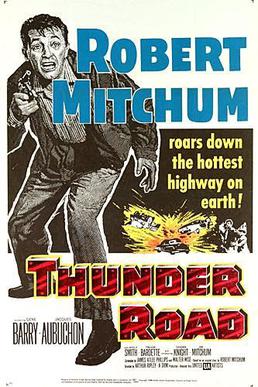
Thunder Road is a 1958 American drama–crime film directed by Arthur Ripley and starring Robert Mitchum, who also wrote the story. The supporting cast features Gene Barry, Jacques Aubuchon, Keely Smith, James Mitchum, Sandra Knight, and Peter Breck. The film's plot concerns running bootleg moonshine in the mountains of Kentucky, North Carolina, and Tennessee in the late 1950s. Thunder Road became a cult film and continued to play at drive-in movie theaters in some southeastern states through the 1970s and 1980s.

Patrick Charles Eugene Boone is an American singer, actor and composer. He was a successful pop singer in the United States during the 1950s and early 1960s. He sold more than 45 million records, had 38 Top 40 hits, and appeared in more than 12 Hollywood films.
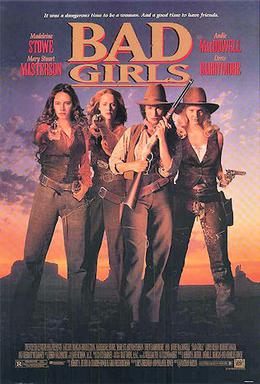
Bad Girls is a 1994 American Western film directed by Jonathan Kaplan, and written by Ken Friedman and Yolande Turner. It stars Madeleine Stowe, Mary Stuart Masterson, Andie MacDowell and Drew Barrymore. The film follows four former prostitutes on the run following a justifiable homicide and prison escape, who later encounter difficulties involving bank robbery and Pinkerton detectives.
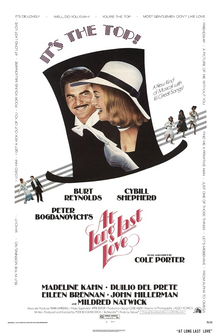
At Long Last Love is a 1975 American jukebox musical comedy film written, produced, and directed by Peter Bogdanovich, and featuring 18 songs with music and lyrics by Cole Porter. It stars Burt Reynolds, Cybill Shepherd, Madeline Kahn, and Duilio Del Prete as two couples who each switch partners during a party and attempt to make each other jealous. Bogdanovich was inspired to make a musical with Porter's songs after Shepherd gave him a book of them. All of the musical sequences were performed live by the cast, for At Long Last Love was meant by Bogdanovich to be a tribute to 1930s musical films like One Hour with You, The Love Parade, The Merry Widow and The Smiling Lieutenant in which the songs were shot in that way.
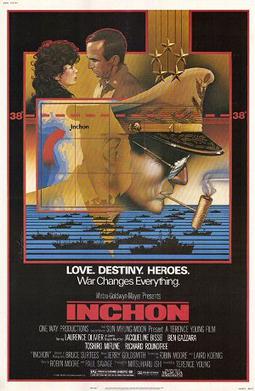
Inchon is a 1981 war film about the Battle of Inchon, considered to be the turning point of the Korean War. Directed by Terence Young and financed by Unification movement founder Sun Myung Moon, the film stars Laurence Olivier as General Douglas MacArthur, who led the United States' surprise amphibious landing at Incheon, South Korea in 1950, with Jacqueline Bisset, Ben Gazzara, Toshiro Mifune and Richard Roundtree.
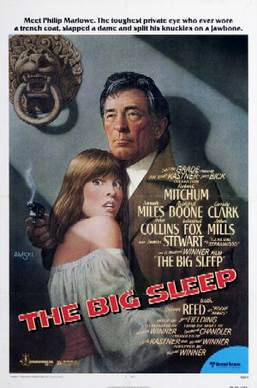
The Big Sleep is a 1978 neo-noir film, the second film version of Raymond Chandler's 1939 novel of the same name. The picture was directed by Michael Winner and stars Robert Mitchum in his second film portrayal of the detective Philip Marlowe. The cast includes Sarah Miles, Candy Clark, Joan Collins and Oliver Reed, and features James Stewart as General Sternwood.
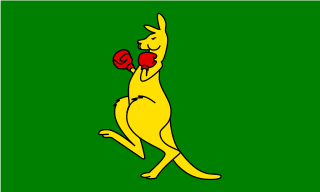
The boxing kangaroo is a national symbol of Australia, frequently seen in pop culture. The symbol is often displayed prominently by Australian spectators at sporting events, such as at cricket, tennis, basketball and football matches, and at the Commonwealth and Olympic Games. The flag is also highly associated with its namesake national rugby league team – the Kangaroos. A distinctive flag featuring the symbol has since been considered Australia's sporting flag.

"The Yellow Rose of Texas" is a traditional American song dating back to at least the 1850s. Members of the Western Writers of America chose it as one of the Top 100 Western songs of all time. Many versions of the song have been recorded, the most popular of which was by Mitch Miller, whose version reached No. 1 in the United States in 1955. Its popularity made it an unofficial state song of Texas.

Peter Paul Fix was an American film and television character actor who was best known for his work in Westerns. Fix appeared in more than 100 movies and dozens of television shows over a 56-year career between 1925 and 1981. Fix portrayed Marshal Micah Torrance, opposite Chuck Connors's character in The Rifleman from 1958 to 1963. He later appeared with Connors in the 1966 Western film Ride Beyond Vengeance.

Darling Lili is a 1970 American romantic-musical spy film, written by William Peter Blatty and Blake Edwards, the latter also directing the film. It stars Julie Andrews, Rock Hudson, and Jeremy Kemp, with music by Henry Mancini and lyrics by Johnny Mercer. This was the last full musical to have song lyrics written by Mercer.

"Tie Me Kangaroo Down, Sport" is a song written by Australian singer Rolf Harris in 1957 which became a hit around the world in the 1960s in two recordings. Inspired by Harry Belafonte's calypsos, most noticeably "The Jack-Ass Song", it is about an Australian stockman on his deathbed.
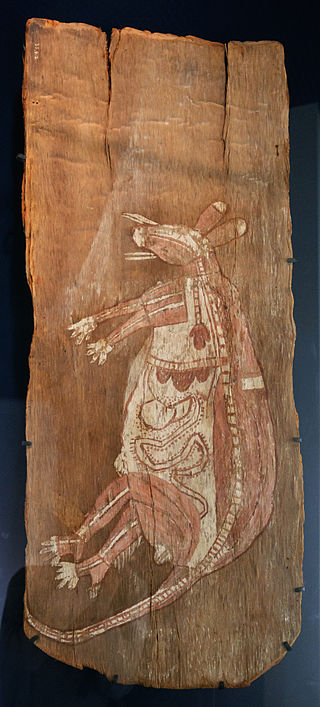
Kangaroos, Wallabies and other Macropodidae have become emblems and symbols of Australia, as well as appearing in popular culture both internationally and within Australia itself.
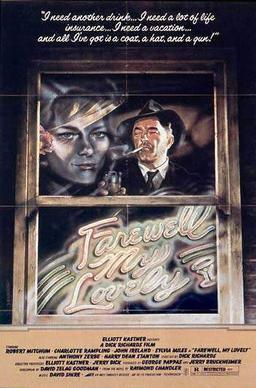
Farewell, My Lovely is a 1975 American neo-noir crime thriller film directed by Dick Richards and featuring Robert Mitchum as private detective Philip Marlowe. The picture is based on Raymond Chandler's novel Farewell, My Lovely (1940), which had previously been adapted for film as Murder, My Sweet in 1944. The supporting cast features Charlotte Rampling, John Ireland, Jack O'Halloran, Sylvia Miles, Harry Dean Stanton and hardcore crime novelist Jim Thompson, in his only acting role, as Charlotte Rampling's character's elderly husband Judge Grayle. Mitchum returned to the role of Marlowe three years later in the 1978 film The Big Sleep, making him the only actor to portray the character more than once in a feature film.
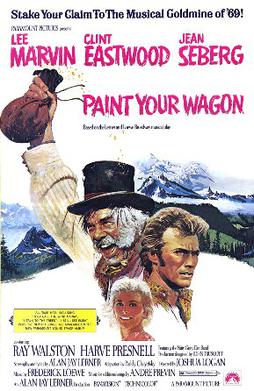
Paint Your Wagon is a 1969 American Western musical film starring Lee Marvin, Clint Eastwood, and Jean Seberg. The film was adapted by Paddy Chayefsky from the 1951 musical Paint Your Wagon by Lerner and Loewe. It is set in a mining camp in Gold Rush-era California. It was directed by Joshua Logan.

Harry and Walter Go to New York is a 1976 American period comedy film written by John Byrum and Robert Kaufman, directed by Mark Rydell, and starring James Caan, Elliott Gould, Michael Caine, Diane Keaton, Charles Durning and Lesley Ann Warren. In the film, two dimwitted con-men try to pull off the biggest heist ever seen in late nineteenth-century New York City. They are opposed by the greatest bank robber of the day, and aided by a crusading newspaper editor.

The Yellow Canary is a 1963 American thriller film directed by Buzz Kulik and starring Pat Boone and Barbara Eden. It was adapted by Rod Serling from a novel by Whit Masterson, who also wrote the novel that was the basis for Orson Welles' Touch of Evil. The film was photographed by veteran Floyd Crosby and scored by jazz composer Kenyon Hopkins.
Jules Leonard "Buddy" Kaye was an American songwriter, lyricist, arranger, producer, and author. His songs were recorded by top performers, including Frank Sinatra, Bob Dylan, Sarah Vaughan, Dinah Washington, Ella Fitzgerald, The McGuire Sisters, Glenn Miller, Sammy Kaye, Perry Como, Elvis Presley, Charles Aznavour, Tony Bennett, Cliff Richard, Pat Boone, Harry Belafonte, Bobby Darin, Little Richard, Barry Manilow, Karen Carpenter, Diana Krall, and Dusty Springfield. He scored number-one hits on the Billboard charts in 1945 with "Till The End Of Time", recorded by Perry Como, and in 1949 with "'A' You're Adorable ", recorded by Como and The Fontane Sisters. Among his most recognizable tunes in pop culture are the theme songs to the Famous Studios theatrical cartoons Little Lulu and Little Audrey; the international hit song "Speedy Gonzales", recorded by Pat Boone; and the co-written theme song to the television series I Dream of Jeannie. In 1976, he won a Grammy Award for best children's album for his production of The Little Prince, narrated by Richard Burton.
If Ever I See You Again is a 1978 American romantic drama film about a composer who rekindles his relationship with a former girlfriend. It stars Joe Brooks, who also co-wrote, produced, directed, and scored the film, and Shelley Hack. The film's theme song, "If Ever I See You Again", was a moderate hit for Roberta Flack, reaching #24 on the Billboard Hot 100 chart.
Melvin Simon Productions was a short-lived film production company of the 1970s and 1980s. It was founded by real estate magnate Melvin Simon.

















